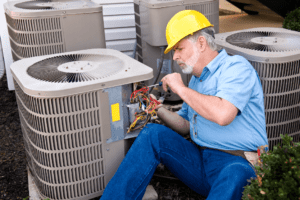
Prevention is the better than cure. Especially when it comes to AC repair. Our guide will help you prevent these problems in the first place. You’ll also learn the tell-tale signs to watch out for. Add these simple checks to your routine. You could see the difference in your utility bills and feel benefits of better performance from your HVAC system
Just how much cool air are you losing through leaky ducts?
Your AC unit is producing plenty of cold air. But how much of that cold air is leaking before it gets to where it is needed?
Your ducts are responsible for carrying all that cold air from your AC unit to each room. Leaked cool air will escape to unwanted areas in your house such as the attic or basement where it is wasted. Losing cool air is one problem you’ll be happy to avoid.
Watch out for these tell-tale signs. One room cools slower than others. The vents in that room may blow warmer air than vents blowing cool in other rooms. You might notice that your AC unit is working harder than expected. These are potential signs your HVAC has leaky ducts.
What causes leaky ducts? Dry or older pipework can become brittle. Loose pipe connections or tired seals. When cracks or holes appear cold air is lost. The uncomfortable part? This air is not making it to your living area you need it most. And that’s hurting your pocket too.
Before you call for AC Repair do some simple checks. Look for anywhere cool air may be escaping. Sealing any leaks or holes can be a simple fix.
Clogged Drains another potential problem best avoided
It is just science. Cool air cannot hold as much moisture as warmer air. When your HVAC cools the air it also has to provide safe collection and drainage of all excess moisture that results from cooling that air.
Now most people know that unwanted water can cause a lot of damage. This is why drainage really becomes a critical part of your air conditioning cycle. To avoid expensive AC repairs and water damage, your HVAC drainage is an area you shouldn’t overlook.
 Watch out for – keep drainage lines clear from obstruction, dirt or debris. Bunged up drainage lines could cause water collection to back up. Potentially causing damage to your HVAC unit or worse, and worse causing water damage to your home over time. These are AC repairs easily avoided. Regularly check drains are clear and working properly.
Watch out for – keep drainage lines clear from obstruction, dirt or debris. Bunged up drainage lines could cause water collection to back up. Potentially causing damage to your HVAC unit or worse, and worse causing water damage to your home over time. These are AC repairs easily avoided. Regularly check drains are clear and working properly.
Refrigerant Leaks
When refrigerant expands it absorbs heat. And when it contracts it loses the heat absorbed. It really is that simple. This cycle is repeated over and over. Heat is absorbed on the inside of your home and dispersed on the outside. Pumps ensure refrigerant circulates and heat exchange happens efficiently with the help of fans, but refrigerant really is the life-blood of the system. Refrigerant leaks should be fixed quickly. Call the AC repair if you spot any leaks. Not to mention leaking refrigerant is an environmental hazard.
Tell tale signs – watch out for any obvious leaks. Lost refrigerant will affect the cooling capacity. Also, if you notice your HVAC unit is working too hard, or ineffectively, low refrigerant levels could be the cause.
Frozen Evaporator Coils
Another counter-intuitive tell-tale sign of a poorly performing air conditioning system is frozen evaporator coils. The most likely cause is low or leaking refrigerant. With less refrigerant in the system, evaporation happens more easily causes lower than expected temperatures and system imbalance. Lower temperatures will freeze any water condensing on the evaporator coils. Low volumes of refrigerant can also cause knock on unwanted high pressure effects in the condensing phase. Increased pressure can cause expensive problems with the condenser blowing seals and connections. This is one AC repair problem you’ll be happy to avoid
Topping up refrigerant is not a long term solution
If you detect refrigerant leaks it is best to call for AC repair. A technician will help discover and repair leaks and can top refrigerant up to correct levels. Topping up regularly is not the ideal solution and is not a long term fix.
Faulty Fans
Your fans have a number of responsibilities. Circulating air around the coils for heat exchange. And distributing all that cooler air around your home. Good air-circulation ensures optimal performance from your air conditioning.
Tell tale signs to watch out for – unusual noise or bad smells could indicate your fan motor is on the way out. Avoid problems with fans in the in the first place – remove any dirt, debris or obstructions restricting your fan, keep proper circulation of air, and keep an eye out for any unusual or erratic behavior. If your unit is switching on and off excessively that is tell-tale sign warning of problems ahead. The original might be elsewhere, such as a faulty thermostat or worse, leaks in the refrigerant. The knock on effect of not fixing the real cause could be worse than just damage to the fans. Keep an ear out for changes in how your fan operates. It could be a sign of other AC repair problem you’ll be happy to catch and fix early.
Summary
The goal of your routine HVAC inspections is easy. Check for clear drains, ensure good air circulation and watch out for unusual behaviour, refrigerant leaks or frozen parts. Prevent these common problems in the first place and you’ll avoid the worst. If any problems are detected your best bet is timely AC repair to prevent them from getting larger. Scheduled inspections by qualified technicians as part of a maintenance plan that includes any necessary AC repairs is stress free way to ensure you avoid these common problems.






